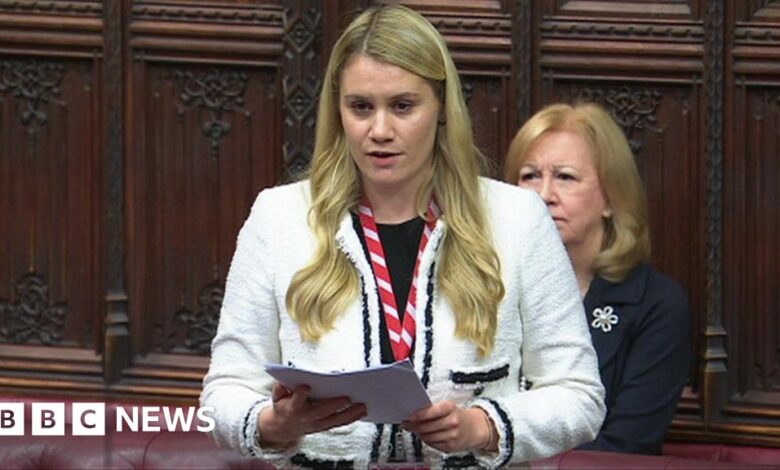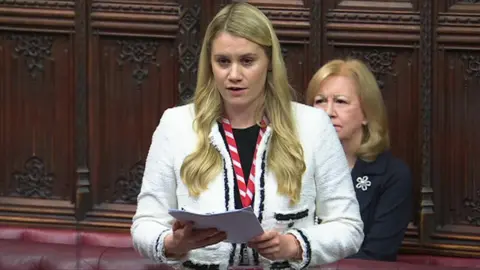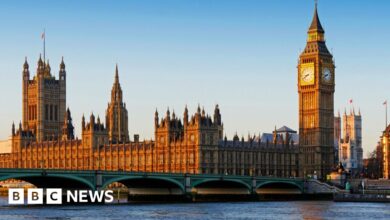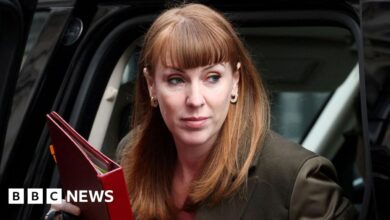Speed up plans to criminalise deepfake abuse, ministers told

 UK Parliament
UK ParliamentMinisters have been urged to speed up plans to criminalise the creation of sexually explicit deepfake images.
Conservative peer Baroness Owen has proposed a law to make it an offence to create or solicit intimate images of people without their consent.
The government has not backed her bill, which would apply to England and Wales, as it is planning to bring forward its own legislation to tackle the issue next year.
However, Baroness Owen criticised ministers for “delaying action”, saying this was “a betrayal of those who need our protection the most”.
A deepfake is an image or video that has been digitally altered with the help of Artificial Intelligence (AI) to replace the face of one person with the face of another.
Baroness Owen said the creation of sexually explicit deepfakes was growing rapidly, with so-called “nudification” apps easily available online.
Her bill would create new offences, with those found guilty facing a fine and up to six months in jail.
But it is unlikely to become law without government support.
The former adviser to Boris Johnson was the youngest member of the House of Lords when she became a peer last year, after being nominated by the ex-prime minister in his resignation honours list.
Introducing her bill in the chamber, Baroness Owen said 99% of sexually explicit deepfakes were of women, describing this as a “disproportionately sexist form of abuse”.
She told peers AI meant “a woman can no longer choose who owns an intimate image of her”.
“Technology has made it possible for them to be created by anyone, anywhere, at anytime, regardless of whether she consents,” she added.
The peer cited research suggesting one app had processed 600,000 images in its first three weeks, while the biggest site “dedicated to deepfake abuse” had 13.4 million hits per month.
Labour’s general election manifesto promised to ban the creation of sexually explicit deepfakes and justice minister Lord Ponsonby said the government agreed more needed to be done to protect women from this form of abuse.
“But we must also act carefully so that any new measures work with existing law and, most importantly, will effectively protect victims and bring offenders to justice,” he added.
He said the government would deliver its manifesto commitment and bring forward its own legislation next year.
Baroness Owen said she was “devastated” the government was not backing her bill, adding: “I know that survivors will feel let down”.
“This bill will save lives and delaying action is a betrayal of those who need our protection the most,” she said.
Liberal Democrat peer Baroness Grender said the bill was “essential”, adding: “Women can’t suffer delay on this issue.”
Sharing or threatening to share sexually explicit deepfake images are already illegal in England and Wales under the Online Safety Act, which passed last year.
The last Conservative government also promised to make creating such images a criminal offence.
However, its proposals ran out of time to become law when the general election was called in May.
Campaigners had raised concerns the proposals would make creating such images a crime only if someone wanted to cause “alarm, humiliation or distress to the victim”, rather than simply if the individual had not consented to their image being used in this way.
Online safety campaigner Baroness Kidron urged the Labour government to ensure any new legislation would not require malicious intent to be proven.
The crossbench peer said: “The one thing we know is that, if you have to prove intent, it is worse than useless.”
Baroness Owen said her bill would be consent-based so the burden was not on the victim to prove intent.
Lord Ponsonby said the government was “actively considering” this issue.
However, he added that in a criminal case “the onus is never on the victim to marshal evidence or to prove intent of the perpetrator”, and this would be a matter for the police and prosecutors.
Andrea Simon, director of the End Violence Against Women Coalition, said any legislation must be consent-based and cover solicitation as well as creation to be effective.
“The public wants to see change and the government must now deliver on this manifesto commitment,” she added.




